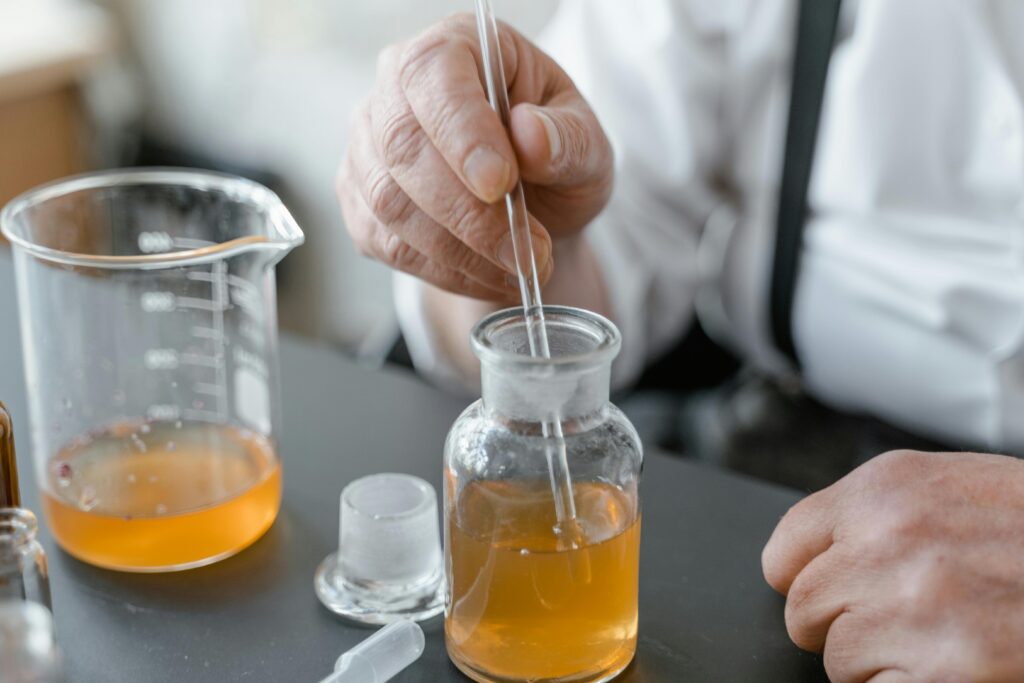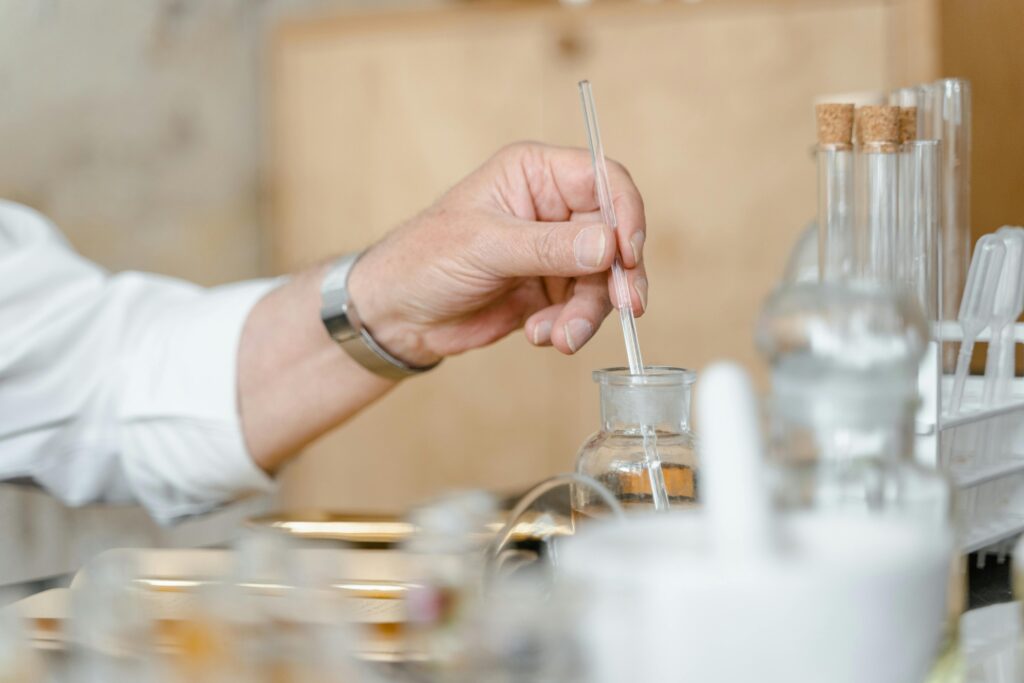For thousands of years, perfume has been an essential component of human culture. Scents have always had a special role in human life, from the temples of ancient Egypt that were filled with incense to the opulent perfume shops of Paris. Beyond just making us smell nice, perfumes have a significant impact on our feelings, actions, and even memories. There is more than just anecdotal evidence to support the scientific basis of the association between fragrances and emotions; it involves intricate neural connections and psychological reactions. This Article explores the intriguing connection between perfumes and the human emotional experience, examining the ways in which scents affect social relationships, generate memories, and affect our thoughts.

1. The Fundamentals of Fragrance Chemistry
Complex blends of fixatives, solvents, and aromatic chemicals make up perfumes.
Top notes
The first fragrances that are noticed right away after application; these are frequently subtle and temporary (e.g., citrus, lavender).
Middle notes
Also referred to as heart notes, these comprise the fragrance’s primary body and appear when the top notes fade (e.g., rose, jasmine).
Base notes
The rich, enduring fragrances that leave a lasting impression (such as sandalwood and vanilla). Our olfactory system—the sensory organ in charge of identifying smells—interacts with these layers. Applying a perfume causes volatile molecules to enter the nasal cavity from the surrounding air and attach to olfactory receptors. Humans can perceive thousands of different odours because of their approximately 400 different types of olfactory receptors. Every receptor communicates with the brain, starting a series of neurological reactions that eventually affect our feelings.
2. The Emotional Reactions Induced by Fragrances
The structure of the brain holds the key to comprehending the connection between fragrances and emotions. When compared to other senses, the olfactory system has a distinct pathway. The olfactory bulb, which is directly linked to the amygdala and hippocampus—the parts of the brain involved in emotion and memory—receives messages when odour molecules attach to receptors in the nose. Scents can elicit strong emotional responses very immediately, which is explained by this direct relationship.
For instance
Lavender is frequently linked to tranquilly and relaxation, which lowers tension and anxiety. Scents of citrus, such as orange and lemon, are stimulating and frequently increase alertness and mood. Warmth and comfort are evoked by sandalwood and vanilla, which foster a sense of security. Scents can affect emotional states without conscious interpretation, unlike visual or auditory stimuli. This explains why, without conscious effort, a single sniff of a well-known perfume produces a barrage of feelings and memories.

3. Memory’s Function in Perceiving Fragrances
Known as the “Proustian phenomenon,” after the French author Marcel Proust, who memorably recounted how the aroma of a madeleine cake evoked strong recollections from his early years, perfumes have a special power to arouse personal recollections. Compared to other sensory cues, fragrances have been shown to evoke more vivid and emotional memories. This occurs because olfactory signals go straight to the limbic system, which stores information pertaining to emotions and memories, bypassing the thalamus, a part of the brain that serves as a relay for the majority of senses.
For instance
A person may get sentimental the moment they smell a loved one’s perfume. Certain scents have the power to evoke strong feelings and thoughts by reminding people of significant life events, holidays, or seasons. As a result, perfumes do more than make a person smell good; they also become entangled with their past and influence their emotional reactions.
4. Fragrances and the Control of Mood
According to scientific research, smells have a significant impact on psychological health and mood. Aromatherapy has grown in popularity for this reason, whether synthetic or natural, perfumes contain flammable substances that can alter neurotransmitter activity in the brain, which can impact behaviour and mood. The following are a few instances of how smells can affect emotions.
Stress Reduction
Calming scents that lower stress hormones and encourage relaxation include bergamot, lavender, and chamomile.
Increased Awareness
Citrus oils, peppermint, and rosemary can boost energy and concentration, which is helpful in work or study settings.
Romantic desire
Although the science is still developing, some pheromone-based fragrances may heighten emotions of closeness and desire. In these circumstances, perfume turns into a tool for emotional self-regulation, enabling people to adjust their emotional State to fit the circumstance or mood they choose.

5. Scent’s Cultural and Psychological Aspects
Culture, individual experiences, and social conventions all have an impact on the emotional impact of scent. For example, a scent that is deemed reassuring in one culture might not be in another. Personal associations with fragrances also influence emotional reactions. When someone smells a perfume they wore on a special occasion, they may experience happiness and reminiscence. Scents of flowers or herbs are associated with spiritual activities in certain cultures, fostering a sense of harmony and community. Perfumes can be a psychological extension of one’s personality. People frequently choose fragrances in accordance with their perception of themselves or the image they want to convey. While a light, fresh perfume may indicate relaxation and approachability, a strong, musky scent may indicate confidence. This self-expression further reinforces the emotional bond between smell and the person.
6. The Science of Emotional Attraction and Pheromones
Beyond only being aesthetically pleasing, some scents may have an impact on sexual and social attractiveness through pheromones, which are chemical cues that alter physiology and behaviour. Some research indicates that fragrance contributes to subconscious attraction, even though the efficacy of signals in humans is still up for debate.Woody or spicy elements in masculine fragrances can boost feelings of strength and self-assurance. Feminine fragrances with flowery or sweet undertones may enhance perceptions of warmth and maternal qualities. Through subtle influences on emotions, preferences, and even partner choice, these olfactory signals have the power to mould interpersonal interactions. In this sense, perfume serves as a means of emotional communication in addition to being a personal luxury.
7. Using Fragrances as a Medicinal Aid
Perfume is becoming more widely acknowledged for its medicinal potential due to its significant impact on mood and memory. In medical environments: Exposure to familiar odours has been found to boost mood and memory recall in patients with dementia or Alzheimer’s disease. Essential oil-based aromatherapy has been used to treat sleeplessness, sadness, and anxiety. Fragrances can act as triggers for relaxation techniques or meditation, increasing emotional awareness and mindfulness. Therefore, perfume provides both delight and quantifiable emotional benefits, bridging the gap between sensory pleasure and mental wellness.
8. Real-World Uses: Selecting Fragrances for Emotional Effect
People who comprehend the emotional science of perfumes can strategically use them Choose sandalwood, chamomile, or lavender for relaxation. Select eucalyptus, peppermint, or citrus for motivation and vitality. Warm, sweet, or flowery fragrances that inspire closeness and optimism are ideal for romantic or social events. To improve mood and mental health, use scents connected to cherished experiences for memory recall or nostalgia. In addition to choosing fragrances, application technique and timing are essential. Scent dispersal and emotional impact can be enhanced by applying perfume to pulse spots, such as the neck, behind the ears, and wrists.

9. Prospects for Research on Fragrances and Emotions
Perfume and emotion science is continually developing. Researchers are investigating. Devices that release particular scents to affect mood or improve virtual reality experiences are known as digital scent technologies. Perfumes that are customised to a person’s emotional reactions are made using genetic, neurological, and psychological information. The study of how scents can more accurately alter brain activity, neurotransmitter levels, and emotional states is known as neuro-perfumery. Fragrances will become progressively more essential to daily living and mental well-being as technology and neuroscience develop, increasing the possibility of harnessing the emotional power of perfume.
10. Final thoughts
More than just a luxury or cosmetic item, perfume is a potent emotional instrument that may affect mood, evoke memories, and mould social interactions. Scent and emotion are closely related in our neurobiology, as olfactory inputs are directly linked to the parts of the brain that control memory and emotion. Perfumes can improve emotional health, provide therapeutic benefits, and even convey personality traits and social intentions when chosen and worn with care. What we wear on our skin is more than just a question of fragrance, according to the science of perfume and emotions. It is a window into our brain, a link to our past, and a subtle but significant influence on the emotional terrain we experience daily. Perfume is both an art and a science since it enables people to interact with the world more profoundly and sensitively by comprehending and utilising this link.